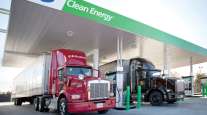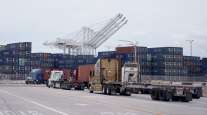House Panel Urged to Boost Fuel Taxes to Pay for Vital Infrastructure Projects
This story appears in the April 29 print edition of Transport Topics.
WASHINGTON — Top executives with two of the nation’s largest trucking companies urged Congress to raise the federal fuel tax in order to fund infrastructure projects that benefit freight.
“It is time for Congress to make the difficult — but vital — decision to raise or index the fuel tax, or do both, to ensure stable funding is available and to address the costly inefficiencies facing our highway network,” said Derek Leathers, president and chief operating officer of truckload carrier Werner Enterprises Inc.
Similarly, Fred Smith, chairman and CEO of FedEx Corp., declared that a fuel tax or other user-fee increase is a major legislative need for the ground-based units of the company he founded.
“We need a funding mechanism in the form of a fuel tax or vehicle-mileage tax, which the user community almost universally supports, in order to fund additional infrastructure, particularly in congested areas of the country,” Smith said.
The comments were made here on April 24 at the first hearing of the Panel on 21st Century Freight Transportation, a special, temporary panel created by Rep. Bill Shuster (R-Pa.), chairman of the House Transportation and Infrastructure Committee.
While all 11 lawmakers on the panel generally agreed that additional money is desperately needed, most went out of their way not to endorse any specific funding mechanisms.
That did not sit well with Rep. Richard Hanna (R-N.Y.), who was the only one to mention a hike in the fuel tax as a possibility.
“The elephant in the room that people just spoke about is: how do we pay for all of this?” Hanna said. “We have unanimity there, yet in Congress, we seem to have a real problem even broaching the subject,” Hanna said.
The panel is headed by Rep. John Duncan Jr. (R-Tenn.). Rep. Jerry Nadler (D-N.Y.) is the top Democrat on the panel.
The federal fuel tax, last increased in 1993, is currently 24.4 cents per gallon of diesel and 18.4 cents per gallon of gasoline. It goes to the Highway Trust Fund, from which federal money for highway and transit projects are funded.
But those projects have become more expensive since 1993, and increased fuel efficiency among all vehicles has reduced the amount of available money, Werner’s Leathers said.
Congress estimates that the fund will become insolvent in 2015, and it has already received money from the government’s General Fund multiple times in recent years.
“We cannot continue to rely on the General Fund to bail out the program year after year,” Leathers said. “And reducing the size of the program to match current user-fee receipts is simply untenable on our view.”
Werner ranks No. 11 on the Transport Topics Top 100 list of the largest U.S. and Canadian for-hire fleets. FedEx ranks No. 2.
In addition to Leathers and Smith, Charles Moorman, CEO of Norfolk Southern Corp., and Ed Wytkind, president of the Transportation Trades Department of the AFL-CIO, endorsed a fuel-tax increase.
However, Rep. Daniel Webster (R-Fla.) disagreed with raising the fuel tax, pointing out the success of recently built toll roads in his home state.
“We very strategically used tolls to create a limited-access highway system,” he said. “That, more than anything, is a user-pay system. And it works.”
Webster also disagreed with an estimate from Leathers that as much as 50% of the revenue collected on toll roads pays for administration.
“Every dime collected goes back into transportation projects,” he said.
Duncan said the special panel is tasked with making recommendations on freight policy to the full Transportation Committee. In the coming months, the freight panel will hold hearings in or near Los Angeles; Memphis, Tenn.; Louisville, Ky.; and New York City.




